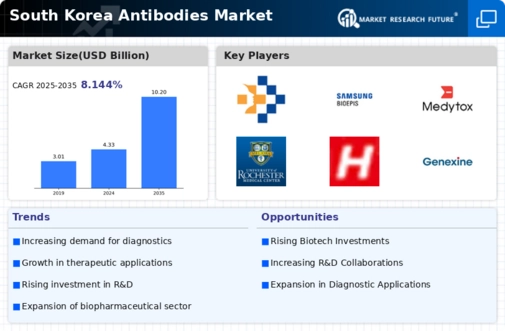Growing Demand for Targeted Therapies
The antibodies market in South Korea is experiencing a notable surge in demand for targeted therapies. This trend is largely driven by the increasing prevalence of chronic diseases, such as cancer and autoimmune disorders, which require more precise treatment options. As healthcare providers and patients alike seek therapies that minimize side effects while maximizing efficacy, the antibodies market is poised for growth. In 2025, the market is projected to reach approximately $1.5 billion, reflecting a compound annual growth rate (CAGR) of around 8%. This shift towards personalized medicine is likely to further stimulate innovation and investment in the antibodies market, as companies strive to develop novel therapeutic antibodies that cater to specific patient needs.
Rising Incidence of Infectious Diseases
The antibodies market in South Korea is also influenced by the rising incidence of infectious diseases. As the population ages and urbanization increases, the susceptibility to infections is likely to grow. This trend necessitates the development of effective antibody-based treatments and vaccines to combat various pathogens. The South Korean government has recognized this challenge and is investing in public health initiatives aimed at enhancing disease prevention and control. Consequently, the antibodies market is expected to expand, with a projected growth rate of 6% in the coming years. This focus on infectious disease management underscores the critical role that antibodies play in safeguarding public health and highlights the potential for market growth.
Strategic Collaborations and Partnerships
Strategic collaborations and partnerships among key stakeholders are shaping the antibodies market in South Korea. Pharmaceutical companies, research institutions, and universities are increasingly joining forces to leverage their expertise and resources. These collaborations facilitate the sharing of knowledge and technology, accelerating the development of innovative antibody therapies. In 2025, the number of partnerships in the biopharmaceutical sector is anticipated to rise by 15%, indicating a robust ecosystem for antibody research and development. Such strategic alliances not only enhance the capabilities of individual organizations but also contribute to the overall growth of the antibodies market, as they enable faster and more efficient pathways to bring new therapies to market.
Increased Research and Development Activities
The antibodies market in South Korea is bolstered by heightened research and development (R&D) activities. Government initiatives and funding programs aimed at fostering innovation in biopharmaceuticals are encouraging both public and private sectors to invest in R&D. This focus on developing new antibody-based therapies is likely to lead to breakthroughs in treatment options for various diseases. In 2025, R&D spending in the biopharmaceutical sector is projected to exceed $500 million, reflecting a commitment to advancing the antibodies market. The continuous exploration of novel antibody applications, including diagnostics and therapeutics, suggests a vibrant future for the market, as new discoveries may pave the way for improved patient outcomes.
Technological Advancements in Antibody Production
Technological innovations in antibody production are significantly impacting the antibodies market in South Korea. The advent of recombinant DNA technology and hybridoma techniques has enhanced the efficiency and yield of antibody production. These advancements not only reduce production costs but also improve the quality and specificity of antibodies. As a result, the antibodies market is witnessing an influx of high-quality therapeutic options, which are essential for treating various diseases. In 2025, the market is expected to benefit from these technological improvements, with an estimated growth rate of 7% annually. This trend indicates a strong potential for companies that invest in cutting-edge production technologies to gain a competitive edge in the antibodies market.
















